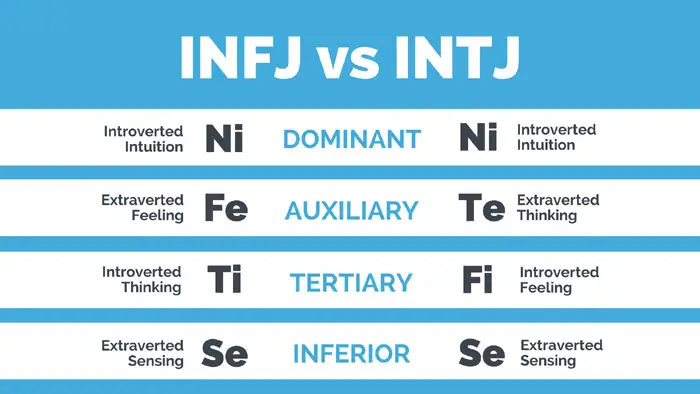Disclosure: There might be affiliate links on this page. As an Amazon Associate, I earn from qualifying purchases. This means I will earn a commission if you decide to make a purchase through my links but it will be at no additional cost to you.
When I was seventeen years old, my school had all the students do the official Myers-Briggs Type Indicator (MBTI) and I was tested INTJ.
But at that time, I wasn’t convinced because I scored 51% for Thinking and 49% for Feeling.
I couldn’t decide if I’m more of a thinker or a feeler.
So I read the booklet, Introduction to Type, that was given to all the students. After reading both the INTJ and INFJ profiles, I settled for INTJ and never think too much about my MBTI type.
It wasn’t until years later when I started doing online MBTI tests again and I kept getting consistent results as an INFJ that I realized I was wrong previously.
It’s difficult to determine your personality type when you lack self-awareness
or when your personality isn’t fully developed yet.
When I was a student, most of my interactions were based in school. My favorite subject is mathematics and I can think logically so I thought I was more of a thinker. Furthermore, I had low self-esteem and I found it difficult to interact with others at that time, so when I read the profiles, I thought I was more like an INTJ than an INFJ.
However, as I grow up and have more interactions with others, I have a better idea of my natural preferences and my personality becomes more defined. Then, I realized I was an INFJ.
“Am I an INFJ?” Blog Post Series
This is part two of the “Am I an INFJ?” blog post series. In this series, we will discuss the similarities and differences between INFJ and other personality types:
I’ll be using the cognitive function to explain the differences between the various personality types. Each MBTI type has its own unique function stack (i.e. the order of your cognitive preference). So one letter difference results in a different order.
If you want to learn more about the function stack, here’s the cognitive functions chart for each of the 16 personality types.
Please note I’m neither a certified MBTI practitioner nor I wish to be one. I write this post based on my insights and observation of the people around me. If you are dead serious in determining your personality type, you can hire and talk to a certified MBTI practitioner instead.
INTJ vs INFJ: What’s the Confusion?
People are often confused between INTJ and INFJ personality types because they misinterpret the “feeling” preference as being emotional. In reality, INFJs tend to see themselves as analytical and intellectual, rather than emotional. Our emotions are often affected by the people around us.
INTJs, on the other hand, might appear aloof and cold. But they have emotions too. Just that their emotions are often hidden from public eyes.
The thinking-feeling dichotomy is about how you make decisions.
It’s not about how emotional you are as a person. The thinkers will consider the logical consequences of their choice while feelers will tend to base their decisions on personal values (Fi) or other people involved (Fe).
INFJ or INTJ?: A Quick Test
If you want a quick test to determine if you are an INFJ or an INTJ, answer the following question:
Do you tend to consider others when you make your decisions?
If yes, you are most likely to be an INFJ. If not, you are most likely to be an INTJ.
Due to our extraverted feeling (Fe) function, INFJs often consider the impact of their decisions on other people and how others would feel. In contrast, INTJs tend to be more objective in their decision-making.
INFJ and INTJ Cognitive Function
INFJ’s cognitive functions stack is as follows:
- Introverted Intuition (Ni)
- Extraverted Feeling (Fe)
- Introverted Thinking (Ti)
- Extraverted Sensing (Se)
While an INTJ cognitive functions stack is as follows:
- Introverted Intuition (Ni)
- Extraverted Thinking (Te)
- Introverted Feeling (Fi)
- Extraverted Sensing (Se)
INFJs and INTJs are the only two types that share
the same dominant function, Introverted Intuition (Ni).
Due to the same dominant function (Ni), INFJs and INTJs share the same inner world, a world of concepts and patterns. Both types are insightful, creative, and visionary. We need our private space and solitude to come out with new insights and ideas.
But these two MBTI are rather different when it comes to interacting with the outer world. INFJs have extraverted feelings (Fe) as their auxiliary function while INTJs have extraverted thinking as their auxiliary function. I was confused about whether I am an INFJ or INTJ for years until my auxiliary function (Fe) became more apparent to me.
4 Differences Between the INFJ and INTJ Personality Types
1. INFJs and INTJs make decisions differently (Fe vs Te).
Both INFJs and INTJs think about the big picture and long-term when it comes to making decisions. But for INFJs, we are more likely to be swayed by the people involved or compromise due to their extraverted feelings (Fe), whereas INTJs are less likely to care about what other people think of their decisions. They are more likely to base their decisions on facts and effectiveness (Te).
One of my INTJ friends is an entrepreneur. He told me that he fired someone on the first day because his work is subpar. If I were in his shoes, I would probably give the other person a chance to improve, understand what is causing their poor performance, and try to help. It’s much harder for INFJs to end relationships with others even if they are not beneficial.
INTJs are far more objective and less impressionable than INFJs.
INTJs are known to put their emotions aside when making decisions. They do this so well that others often misunderstand them as cold-blooded. But it’s not that they don’t have emotions or don’t care about people. They just process emotion rationally and don’t let it get in their way.
For INTJs, they understand conceptually that someone is feeling sad but they don’t feel the other person’s emotions as much as an INFJ does. For INFJs, we feel other people’s emotions as though it’s our own. We are empathetic and we internalize other people’s suffering. Thus, it’s hard for us to separate other people’s feelings when making decisions.
2. INFJs and INTJs have different communication styles (Fe vs Te).
One sure way to tell whether you are an INFJ or INTJ is to notice your communication style. Both INFJs and INTJs are insightful but the way we share our insights is different.
INTJs are blunt, whereas INFJs are approachable.
INTJs are direct, candid, and blunt in their communication. If their friends want to do something that INTJs think it’s irrational, they will tell their friends so and let them know the better way to do it. They don’t beat around the bush.
For INFJs, we tend to “sugarcoat” the truth. We will listen to our friends’ suggestions, understand their perception first, partially agree with them, and then suggest a better way to do it. Seldom, you will see INFJs force their insights on others or demand others to believe what we say. That’s why we appear more warm and approachable than INTJs.
Neither way is the right way to communicate with others. For some people, you have to be direct with them so that they can hear the truth. But for other people, it’s easier to get the message across if you use the soft approach.
3. INFJs and INTJs have different interests in terms of their careers (Fe vs Te).
Both INFJs and INTJs enjoy working alone and want autonomy in their work. We want to have the freedom to express our insights and exercise our creativity without feeling restricted by rules and regulations or tied down by routine work.
However, when looking for a career, INFJs tend to look for something meaningful that helps people and the world. We want to do something that can make a difference in other people’s lives. So most of us end up in helping professions such as counselors, teachers, and coaches.
Or we might also choose careers that we are deeply passionate about such as careers in the creative and arts industry.
INFJs are more idealistic, while INTJs are more realistic.
INTJs would choose a career that they can be competent in, utilizes their gifts, and pays well. They would choose a career that allows them to be objective such as a field in science over something subjective like the arts. They tend to be career-minded, confident, and business-like too. Even though INFJs can also be entrepreneurs, the main focus of our business is usually about helping others. We tend to be less interested in the mechanics of the business.
Both INFJs and INTJs are problem-solvers. But we use our Ni differently due to the difference in our auxiliary functions (Fe vs Te). INFJs have insights about human relationships and people while INTJs have insights about external systems. They know how the markets work and the best practices. So they tend to earn more in their careers too.
4. INFJs and INTJs trust different types of information (Fe vs Te).
Due to our extraverted feeling (Fe), INFJs have the habit of listening to different opinions of people and then see what makes sense to us (Ti). Since we are open to understanding different perspectives and knowing where people are coming from, we are more receptive to subjective information. So we are more likely to trust information based on other people’s personal experiences.
In contrast, INTJs tend to only trust information that is researched and backed up by facts or science. The information has to be tested or show a consistent pattern in the external world. They tend not to trust subjects that are ambiguous or cannot be proven such as spirituality and philosophy. They are less likely when compared to an INFJ to believe in a higher power and be interested in books on the Law of Attraction, energy healing, chakras, and etc.
INFJs are less likely to trust facts and figures,
while INTJs are less likely to trust something mystical and subjective.
So when INFJ and INTJ come together and share their insights with each other, they might have conflicts. INTJs might not understand why INFJs don’t follow a path that has been proven to be sound and efficient. Instead, we choose a path that is illogical to INTJs.
INFJs, on the other hand, not only find facts and figures boring and uninspiring but they also don’t resonate with them. For example, if a fact states that 90% of the people who perform a certain action have a favorable outcome. This means little or nothing to INFJs because we usually are the 10% outliers that don’t fit the norms. Furthermore, the so-called “favorable” outcome might not be “favorable” to an INFJ.
INFJs have a holistic way of living which works for them, while INTJs have an efficient way of living which works for them. Both personality types are stubborn due to their dominant function, introverted intuition (Ni), If both types were to convince each other that their path is better, then it is a recipe for disaster and will lead to unnecessary relationship problems.
Final Thoughts
Figuring out your MBTI type can be confusing sometimes. If you still feel lost about your MBTI type, watch the video below:
Featured Photo Credit: Craig Adderley








